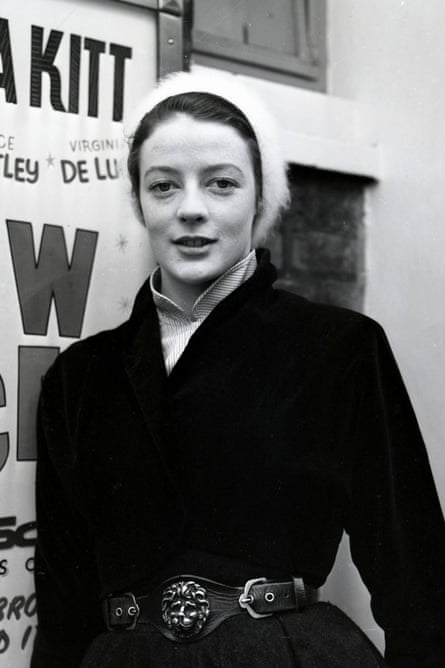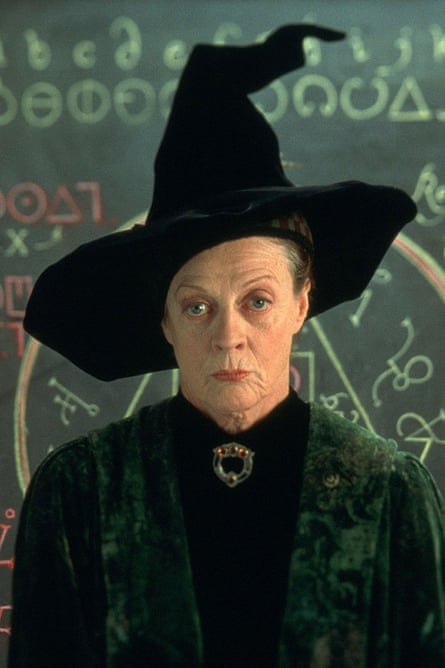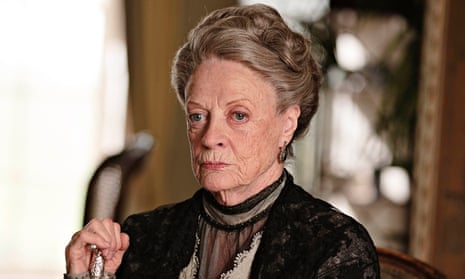Long before Violet Crawley, Dowager Countess of Grantham, would cast her withering eye around the goings on at Downton Abbey, its creator, Julian Fellowes, was a teenager, sitting in the hush of the Old Vic theatre. That year – 1964 – Fellowes was being given a cultural education by his mother, who thought him a “barbarian”. He went to see Margot Fonteyn dance and Maria Callas sing, and at the Old Vic, home then to the newly established National Theatre, he was there to see Laurence Olivier play Othello. But the teenager’s attention was really captured by Desdemona: Maggie Smith.
“I can’t tell you how fascinating she was,” he says. “She had the most extraordinary raw innocence that really made you cry. I had already seen quite a lot of Shakespeare then, and God knows I’ve seen enough since, but I cannot remember a more moving performance than hers. And it haunted me afterwards.”
Smith, who would turn 30 at the end of that year, had already been a theatre star for nearly a decade, in the West End and on Broadway. Now, 50 years on – despite a lifetime on stage and screen, a huge number of awards including two Oscars and five Baftas, having worked with Olivier, Bergman, Gielgud, survived 10 years of Harry Potter films, becoming a Dame and, later, Companion of Honour, in the process – it is for her role as the Crawley family matriarch in Downton Abbey that Smith has become best known.

This level of fame does not seem to sit well with her. She recently spoke about being mobbed in Paris “by Americans” – you can imagine the dowager countess saying this, picking over the words carefully should they leave a nasty taste in the mouth – when all she wanted to do was quietly look around art galleries. “I don’t go to places and if I do I nearly always have to have a friend,” she told the Telegraph. “It’s very difficult when you’re on your own because you have no escape … what do they do, these huge movie stars? What the hell do they do? Perhaps they never go out.”
Smith was born in Ilford, though grew up in Oxford when her father, a lab technician, moved there for work. Her mother, a secretary, was not keen on Margaret (she became Maggie in the 1950s when she left for Broadway) becoming an actor – Margaret had decided early on this is what she would do – and instead thought she should take a secretarial course. She abandoned this idea only when Smith won an Oscar for The Prime of Miss Jean Brodie in 1969.
In his 1992 biography of the actor, the theatre critic Michael Coveney writes that Smith’s childhood is absolutely key to understanding her, both in person and as a performer known for the “stifled aside, the muttered barb, the slightly malicious crack”. She was, he writes, “a lonely child, at odds with her parents, with her school, with her brothers [twins, six years older than she was] and even with herself. But her instinct was not to rebel; it was to mock tartly from the sidelines and to retain, by stealth, her own spirit and independence.”
She joined the Oxford Playhouse Theatre School, then the Oxford Repertory Players. Success followed success and by the time she joined Olivier’s National Theatre as a founding member in 1963, her film career was taking off. She says none of her career has been planned: “It’s what turns up, quite honestly. When I started out I didn’t have any of this [film and television roles] in mind. Not a scrap of it. I just thought it was going to be all theatre and wonderful.”
She had wanted to be a “serious actress” she said in 2004, “but of course that didn’t really happen. I did Desdemona [opposite Olivier] with great discomfort and was terrified all the time”. Shakespeare, she said, “is not my thing”. It is hard to say what Smith’s “thing” is. She is a comic actor with a talent for instant intimacy with an audience that can make any performance feel utterly real, and often far more moving than something obviously “serious”.
“She can capture in a single moment more than many actors can convey in an entire film,” says Nicholas Hytner, who has just spent several months working with Smith, filming The Lady in the Van, based on the Alan Bennett play in which he directed Smith at the Queen’s Theatre, London, in 1999. “She can be vulnerable, fierce, bleak and hilarious simultaneously, and she brings to the set each day the energy and curiosity of a young actor who’s just started out.”
Smith has a reputation for spikiness and not suffering fools, but people who have worked with her often describe her sense of humour. “There’s nothing about Maggie that is a cliche, so I’m not going to offer the standard cliche that she has a heart of gold,” says the director John Madden, who worked with Smith in his 2011 film The Best Exotic Marigold Hotel, and its sequel, which comes out next year. “She has a warmth and a fantastically mischievous sense of humour that, once she is comfortable, she deploys with laser accuracy and skill.”
He went to visit her at home to pitch the idea of the film. “You instantly sense she is not a person who is going to respond to flattery. She immediately told me all the reasons why she thought she shouldn’t be doing it, and proceeded to dismantle the script for me. But that’s very much her MO. She has an instinct to test things before she puts herself at their disposal. She maintains a carapace of scepticism about everything – the circumstances, the scene itself, the character and so forth.”
Smith sounds daunting, but Madden says this is the wrong word. “She is exacting. I wouldn’t be so glib as to say it’s a defence mechanism, but she just wants to test the water, particularly if she’s going to put herself in the hands of a director, she needs to know that it’s a circumstance she can trust and know where she is.”

Emma Watson, who played Hermione Granger in the Harry Potter series from the age of nine, shared a set with Smith over 10 years. “Maggie is completely straightforward and says it like it is, which I respect immensely. You don’t find many people like that in my industry. Truthfully, I was never aware of Maggie’s greatness. Of the woman I got to share space with she was just the lady who talked to me about what I was doing and bought me chocolates for Christmas. And I think she liked it that way. And I did too.”
Dustin Hoffman, who directed Smith in his 2012 film Quartet about a group of retired opera singers, has said: “She comes to work and has no tolerance for getting something half right. She wants to get it completely right and that’s all she’s concerned about. Nothing less will satisfy her.”
Peter Shaffer, in whose plays Smith has starred, has said: “Maggie’s not relaxed at all, ever. She stands up all the time and walks up and down, and will keep this up from 10 to five … there’s this lone figure at the back of the stage, pacing like a caged creature.”
On Downton Abbey, the younger actors make going to work with Smith sound like a wonderful, but slightly terrifying, school day (a baptism of fire was how Allen Leech, who plays Tom Branson, the socialist-chauffeur-turned-cherished-son-in-law, put it). “She’s very tough, she’s tough on herself, she works very hard and takes it seriously,” says Fellowes.
He wrote the character of Violet Crawley for Smith, as an extension of the part of the Countess of Trentham in his screenplay for the film Gosford Park, where he first met her. “With Maggie, from the start, you have this very powerful narrative intelligence,” he says. “She understands why every line is there and also of course she’s very funny, and so if you give her a line that has the potential to be quite funny, you never have to explain it.
“Conversely, if she ever says: ‘I don’t think this is quite right’ then you would be mad not to listen because her analytical understanding of the structure of a play or film, the nature of the dialogue and where the laughs fall, is really that of a brain surgeon.”
One producer on the show has said he thought Smith was Fellowes’s muse. Is this right? “I think that I have a fascination for very strong women who are also quite witty,” he says. “They appear in practically everything I’ve written and Maggie is the kind of distillation of that.
“I think in a sense she is my muse because I doubt very much I ever work with anyone I feel more in tune with. In real life we’re not in each other’s arms all the time, but professionally we seem to understand what the other one is doing. Writing a series, you write to the performance, so the actor is creating the character as well as you and that’s certainly true with Maggie.”
Perhaps it’s because her career was built in a different era, but Smith has always retained a strong sense of privacy. She rarely gives interviews; when Coveney approached her with the idea of writing a biography, she said: “How absolutely ghastly. How absolutely awful. I can’t think of anything worse.”
It was at the National in the 1960s that Smith worked with the late Robert Stephens, also contracted to the company, who would become her husband (they had two sons together, the actors Chris Larkin and Toby Stephens). It was a turbulent marriage, rocked by his drinking and adultery, and shortly after they divorced she married the playwright Beverley Cross (it was a happy ending to their love story – Cross had first proposed to Smith about 20 years earlier).
Although private, she’s not entirely closed off – in the rare interviews she has given, she has spoken of the difficulty of living with Stephens, who died in 1995, and the grief she still feels after Cross’s death in 1998. “They say it goes away but it doesn’t,” she told the Telegraph. “It just gets different. It’s awful, but what do you do? After the busyness you are more alone, much more. A day that is absolutely crowded keeps your mind away from why you are alone but when it stops there is that deafening silence.”
Hardly surprising then that she keeps on working. Next year sees the release of the Best Exotic Marigold Hotel sequel and The Lady in the Van. And long may Violet Crawley stalk the great rooms of Downton, her wit as sharp and strangely comforting as one of Mrs Patmore’s lemon tarts. “When I’m watching anything she’s in,” says Fellowes, “when she comes on the screen I sort of think ‘we’re all right now’.”
Potted profile
Born: 28 December 1934, Ilford, Essex.
Career: Started at the Oxford Playhouse in 1951, where she appeared in numerous plays; appeared on Broadway in 1956; joined the National Theatre in 1963; nominated for her first Oscar in 1965 for the film version of Othello. On stage she has played Hedda Gabler, and was in Three Tall Women, Private Lives, Lettice and Lovage, and The Breath of Life. Won an Oscar for the Prime of Miss Jean Brodie (1969) and another for California Suite (1978). Other films include A Room with a View, Gosford Park and the Harry Potter series, in which she played Hogwarts deputy headteacher Professor Minerva McGonagall.
She says: “Everything’s an icon. If you have been around long enough you are an icon. A rather dusty icon … or a national treasure.”
They say: “The boundary between laughter and tears is … where Maggie is poised always.” – Alan Bennett

Comments (…)
Sign in or create your Guardian account to join the discussion